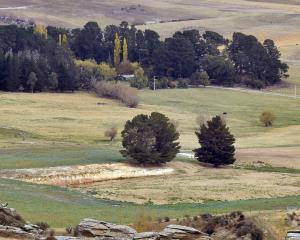
Readers argue that "mown grass and lawns are in essence a desert and simply a hangover from the old English aristocracy who were rather idle." PHOTO: GETTY IMAGES
Clearing the mailbox of garden correspondence
A sensible and friendly idea from the Dunedin City Council, leaving some grass areas longer and letting the flowers and grasses bloom.
I heard an environmental scientist interviewed on RNZ last year, explaining how mown grass and lawns are in essence a desert and simply a hangover from the old English aristocracy who were rather idle.
Thank you Dr Maureen Howard (ODT 24.1.25) for explaining just how important the long grasses are to us and the environment.
I have left a few square metres of my lawn to grow and am amazed at the number of creatures that have taken up residence, especially the honey and bumble bees enjoying the purple clover.
Thank you DCC for leaving areas uncut, especially on walking track verges and the like.
Anthony Reid
Belleknowes
Wild applause
I applaud the council's decision to leave berms and grassed areas "wild" where bees, butterflies and other insect life can thrive.
These creatures, according to research, are fast disappearing.
There is an urgent need to provide environments that support activities such as pollination, vital to our existence on this planet.
Mary Waymouth
North East Valley
Bare land
Residential areas of New Zealand should have at least a 150m gap of bare land from the boundary of their property from any trees planted by Doc, the local council and any forestry developments.
This will help prevent fire disasters in towns and cities.
Mark R. Cowan
Dunedin
Tree trouble
Re the tree hanging over Glenross St: this is a prime example of the wrong kind of tree being planted in small places.
Before you choose/plant any tree, note how high it has the capacity to grow and spread.
Also remember, what you cannot see, is the huge root system under the ground, which can impact on drainage and sewerage pipes.
In small places, choose slow-growing shrubs, not trees.
A. Sarah
Oamaru
Plant natives
Public lawns are costly and emissions heavy while also reducing biodiversity in and around our city.
Now, I love a good picnic spot, but steep banks of clipped grass seems like ill-prioritised spending of council funds.
If local residents (very local, like those neighbouring green spaces) should want to retain their grassy knolls, then maybe they can put their energy towards co-ordinating the maintenance of these spaces.
For areas of less contention I would suggest an immediate investment in natives that will establish over time a rich bush for native species to thrive.
Beautifying our city, filtering air, regulating air temperature, and sequestering carbon with far less expense needed for ongoing maintenance.
Liam Harrison
Caversham
Fruit flies
Great to see the fruit going to waste in people's orchards being collected and used (ODT 25.1.25).
Let's go one step further and plant fruit trees in schools, along the streets and any spare place.
Janice McPherson
Oamaru
Bureaucratic takeovers and crucial questions
Teresa Taylor (Letters, 24.1.24) asks a crucial question arising from the bureaucratic takeover of hospital management since the so-called reforms in health in the 1990s: "where are the voices of our clinical leaders?"
Three episodes stand out in my memories of the early years of the bureaucratic juggernaut's takeover of health management.
In 1991 highly respected surgeon (and the Army's trauma specialist) Mike Hunter apologised to the public in this newspaper for leaving Dunedin Hospital because, he said, he could no longer do his job in the public system.
In 1995 an Oamaru nurse wrote to me as follows; ". . . the 17 nurses who resigned are great nurses but who cannot work under the new management system".
Finally, in 1996 the Oamaru Hospital staff magazine Panacea included the following: "A Dunedin nurse recently wrote, `After asking for more staff last week, a computer arrived complete with Windows 95, hard drive and a mouse'.
In the same week Susan Law of HealthCare Otago commented on the dumping of 35 staff and their replacement by 15 team leaders: `positions have been disestablished, not people'."
Given the subsequent explosion in health bureaucracy, not least including the dreaded IT proliferation, the public may well echo Teresa Taylor's question.
David Tranter
Waimate
[David Tranter is a former member of the West Coast District Health Board.]
Add a wagon
Re cyclists on the Taieri Gorge train.
The Taieri Gorge train could increase patronage by attracting cyclists if they added on an empty goods wagon to transport cycles from Dunedin or Wingatui up to Middlemarch (and return) so they can easily connect with the wonderful Central Otago rail trail.
Dr Colin Mackintosh
Dunedin
Address Letters to the Editor to: Otago Daily Times, PO Box 517, 52-56 Lower Stuart St, Dunedin. Email: editor@odt.co.nz












